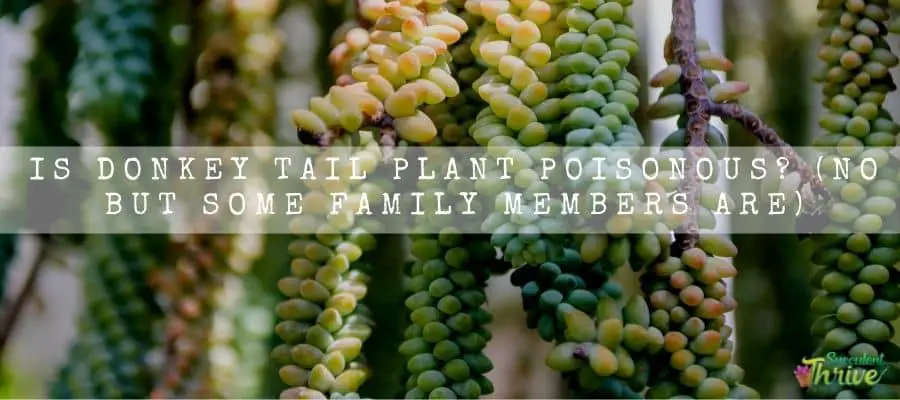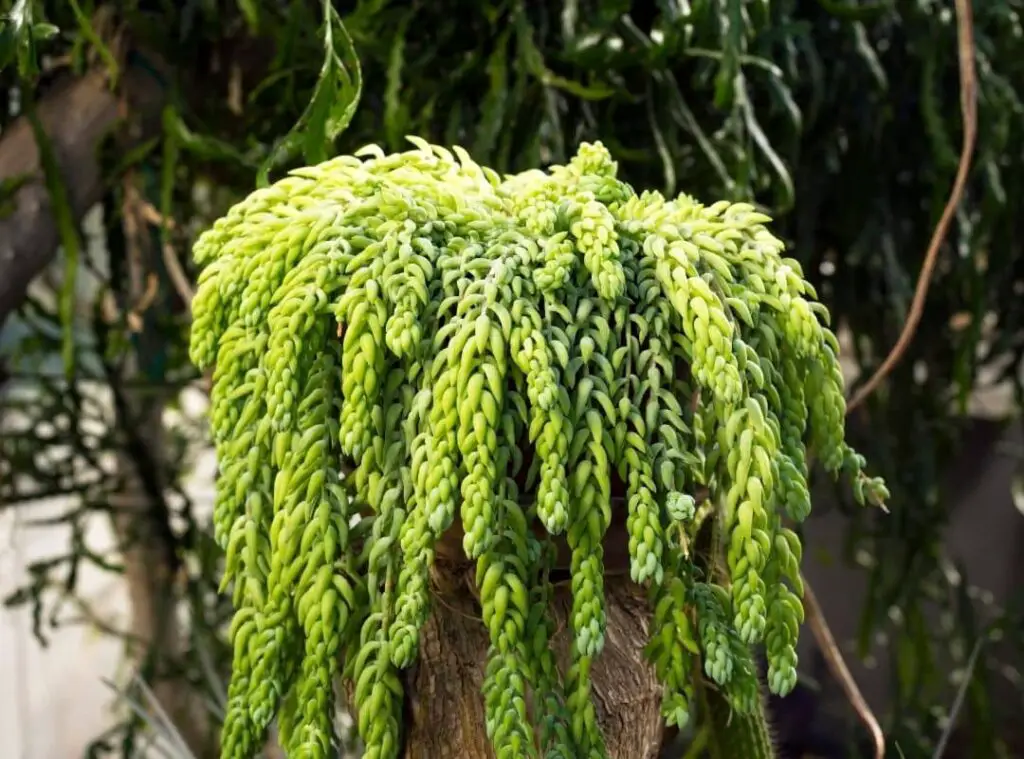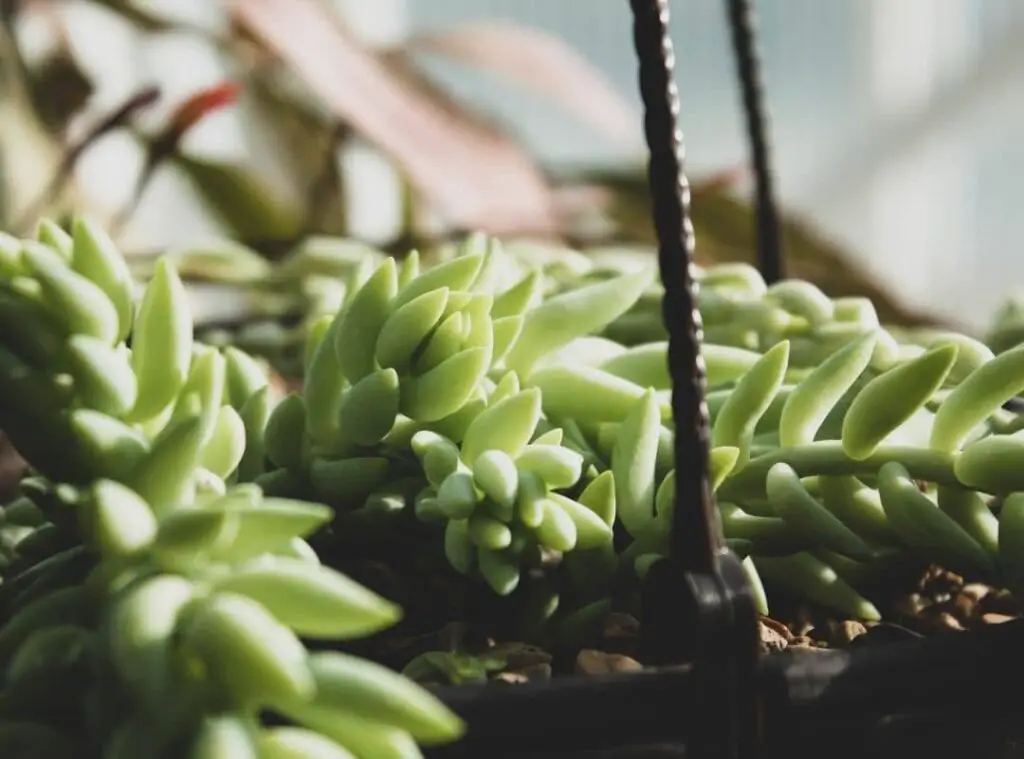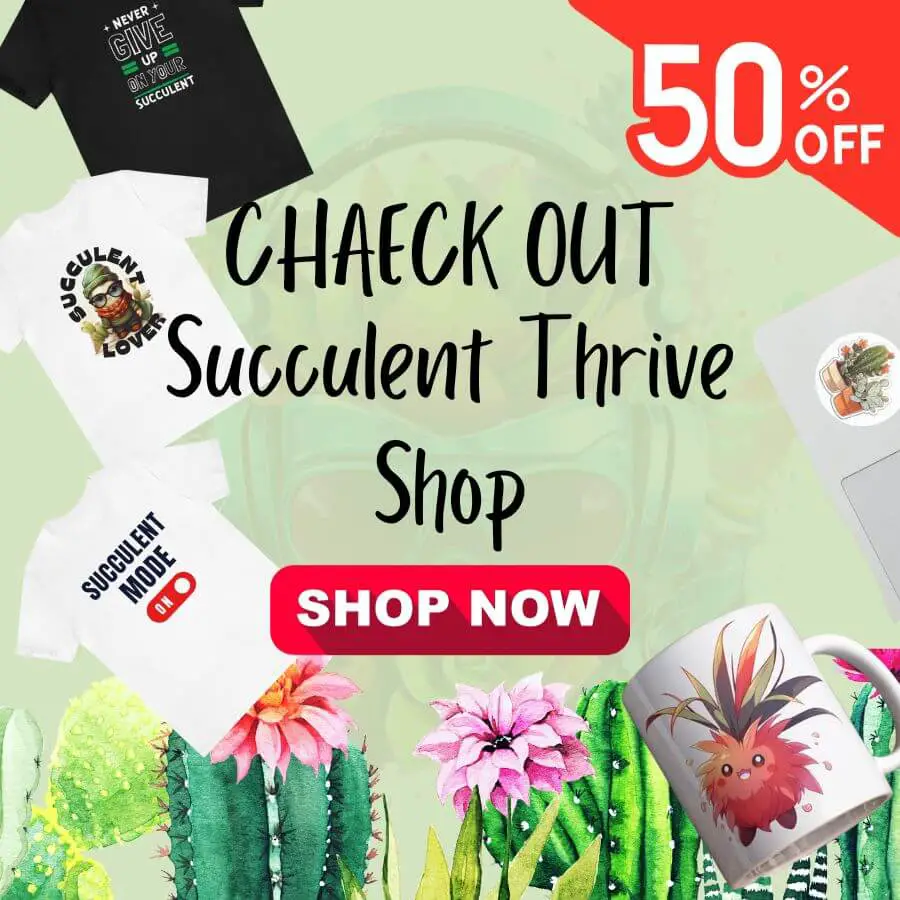There is a debate among succulent gardens whether donkey tail plant poisonous or not. In this article you will find the correct answer for this problem. Keep on reading to seek the truth.

Are donkey tail plants toxic?
No donkey tail plants are not toxic for humans as well as pets.
These are native plants in Mexico and belong to the family Crassulaceae. These are easy to care for plants.
Some of the common names you could use to call these plants are Burros Tail Horses Tail etc.
Donkey tail plants would be a great pick for hanging planters as they tend to grow in a cascading manner.
Donkey tail plants have very fragile leaves, even when you slightly touch them, they would tend to fall on the ground. However, when they fall on the ground, they would root and make new plants.
Toxic family (Crassulaceae) members
Although the donkey tail plant is non toxic some members of the family Crassulaceae have toxic substances.
They have these toxic substances in different parts of the plant. Below are some examples,
- Sap/Juice
- Flowers
- Leaves
- Fruits
- Roots
- Seeds
- Stems
As you may understand it is important that you first protect yourself before starting interacting with toxic plants.
Ideally you need to wear a long-sleeved shirt and rubber gloves when interacting with the plants. Once you complete interacting with the plants, do not forget to wash your hands.
What chemicals do they have?
These plants have toxins such as alkaloids and sedines which cause the toxicity of the plants. Once you consume the plants, it would cause gastrointestinal distress and dermatitis as well.

Animal affected by toxic Crassulaceae plants
They would mainly be poisonous for humans. Apart from humans it could be poisonous for animal species such as Dogs, horses, cats etc.
Once they get in contact with the plant sap, it could cause intestinal and skin injuries on a severe level.
Is toxic Crassulaceae plants toxic to touch
Donkey tail plants could release the toxic sap when it is cut.
Further it could be poisonous when you consume the plant parts too. Other than that you can touch the plants without any problem.
Do not try to touch damaged plants.
Symptoms poisoning
- Swollen eyes / redness in the eyes
- Nausea
- Vomiting
- Diarrhea
- Tremors
- Drunkenness after ingestion
How to identify toxic plant poisoning
Once the sap touches the skin or eyes, it would start to become red. Furthermore, you will feel like they are burning.
Moreover, there will be blisters as well. it would further result in rashes in skin be it on humans or on your pets.
Furthermore, if the plant sap reaches your eye, they will become swollen, and you will feel a great pain there.
Additionally, if you consume the plant parts, you will start vomiting. You may go through diarrhea as well. However, whenever you come across such a situation, you need to immediately consult a doctor.
If your pets have consumed any part of the plants, you need to quickly check whether there are any leftovers remaining in the mouth and you need to remove them if there are any.

Treatments
First aid
As aforesaid, toxic plant sap could make you blind. As such, ensure that you attend to it the very moment you contact the sap.
First and foremost, you need to wash your eyes immediately. Keep washing them for about 15-20 minutes.
However, when you rinse, ensure that the rinsed water does not get in contact with the unaffected areas of the body.
As aforesaid, when the toxins reach the skin, it could make itching, blisters and burns of the skin. So, best is to first sluice the affected area with chill water.
When doing this also, make sure that the washed away water does not reach the unaffected areas of your body. Don’t ever take a warm bath since it could only worsen the situation.
In case your pets have consumed the plant, try washing them to remove the sap if possible. After that you could consult a veterinarian.
Precautions you can take
First and foremost, you should ensure that you are avoiding your kids and pets reaching these plants.
ideally you could place these plants somewhere nobody can reach them. Do not grow them in your yard. However, if you wish to do so, you could place barriers or fences near the plants.
Apart from that you need to always keep in mind to wear all your protective gear to protect yourself first. You need to wear thick gloves and eye protection.
It would be even better if you could cover your whole body by wearing a long sleeved shirt and long pants.
Having said that, ensure that the cloth material is also a heavy material one so that the sap cannot reach through the material.
Once you complete attending to the plant’s maintenance work, dispose of them or leave them in a place where nobody can reach them.
Afterwards you could have a proper wash so that you will be fully protected.
Related questions
Can a donkey tail plant blind you?
No they are not toxic and they could not blind you. Even Though they are not toxic please consult a doctor if plant sap goes to your eye.
Eye is a very sensitive organ and any forign substances can harm your eye.
Is the sap from a donkey tail plant poisonous?
No The sap of Donkey tail plants is not poisonous. But their family members (Crassulaceae) have toxins such as alkaloids and sedine.
Read Next : Is Coral Cactus Toxic? 9 Important Facts You Must Know Is Panda Plant Toxic? | 10 Shocking Facts You Should Know | Is Pencil Cactus Toxic? | 10 Interesting Facts About Toxic Pencil Cactus |


